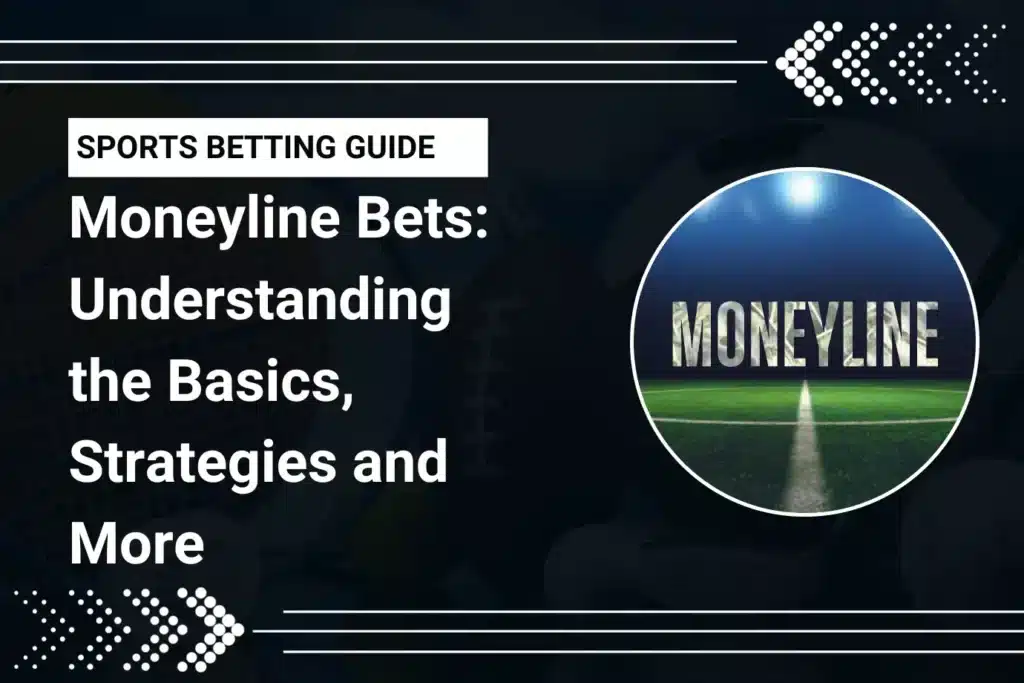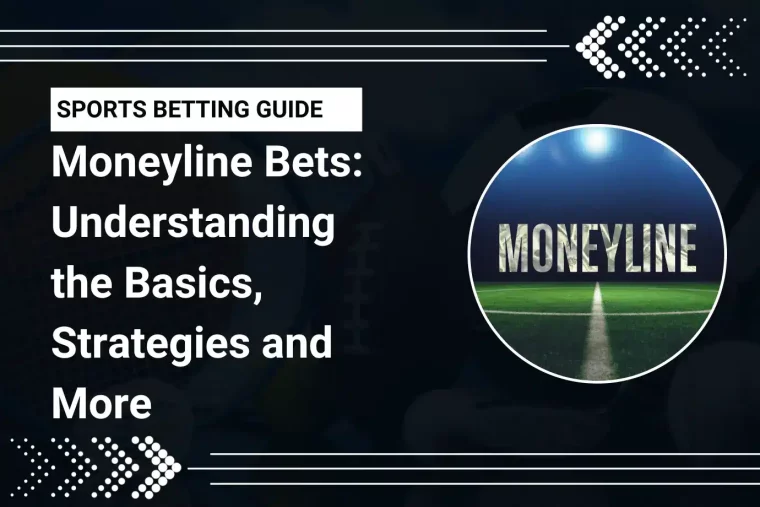
The most fundamental bet in sports betting is the moneyline bet. In this guide, we’ll explore the concept of moneyline bets and offer examples to help clarify this type of sports betting.
Distinguishing itself from spread betting, which employs a handicap to equalize the odds for both teams, a moneyline bet relies solely on the selected team winning for a payout.
While the moneyline bet is theoretically the most straightforward type of wager, there are still nuances to consider. Explore this upcoming NFL game moneyline odds and discover detailed information on placing moneyline bets below.

A moneyline bet is a straightforward wager predicting the victory of one team or player over another. This type of bet is commonly used when betting on individual athletes, such as tennis players, to secure a win in their respective matches. In Moneyline betting, you choose the side you believe will win.
In contrast to spread betting, which introduces a handicap to theoretically balance the odds, a moneyline bet only requires the selected team or player to win for the bet to be successful and pay.
Upon the conclusion of the game or match, the sportsbook evaluates the bet in one of three ways:
Win – The chosen team or player emerged victorious, and the sportsbook returns the initial stake and the winnings.
Loss – The selected team or player was unsuccessful, leading to the sportsbook retaining the stake.
Draw – The game or a specific segment (half, quarter, period, etc.) concluded in a tie. In this case, the sportsbook returns the stake as if the bet never happened.
Here’s an illustration of how a moneyline bet appears.
Moneyline Odds
Dallas Cowboys 1.25 vs Seattle Seahawks 4.25
Based on the odds above, the early line indicates that the Seahawks are a slight home favorite at Lumen Field. The line suggests that oddsmakers anticipate this to be a close contest. It shouldn’t be surprising given that the Cowboys, despite their 3-8 record, have quarterback Justin Fields back under center. The Seahawks (6-5) have lost Kurt Cousins for the season, and the availability of top wide receiver Justin Jefferson remains uncertain. Jefferson has been on injured reserve since early October due to a hamstring injury.
Understanding Moneyline Bets
The easiest way to grasp moneyline bets is to use a $100 bet as an illustration. Let’s say you believe the Seahawks will win this game outright. The total payout on a winning $100 bet would be $225 ($125 profit plus the original $100 bet returned). The implied odds of a Seattle victory are 44.44%.
On the other hand, some bettors might consider taking the Cowboys due to the higher payout potential of the “plus” money. Additionally, some bettors might believe the Cowboys are gaining momentum after a strong showing against the NFC East leaders, the Philadelphia Eagles. Placing the same $100 moneyline bet on the Cowboys would pay $425 with a Dallas victory ($325 profit plus the initial $100 back). The implied odds are around 23.53%, which is slightly lower when compared to a potential Seahawks win.
The moneyline odds reflect the oddsmakers’ assessment of each team’s outright probability of winning the game.
How Do Moneyline Bets Work?
The payouts for moneyline wagers are contingent on the perceived strength of the competing teams in the betting market. It could be more straightforward to back stronger teams against weaker ones because the moneyline payouts are intricately tied to the specific circumstances. When placing moneyline bets, you may need to risk a substantial amount to secure a comparatively modest win, effectively offering the sportsbook a certain price.
Different regions worldwide employ different odds formats, with American odds utilizing a “plus/minus” system centered around $100 wagers.
In this system, the favored team is indicated by a minus sign followed by a number, representing the amount you must wager to win $100. For instance, -400 means you need to bet $400 to win $100.
On the other hand, the underdog is identified by a plus sign and a number, reflecting the potential winnings on a $100 stake. For example, +400 implies a potential win of $400 on a $100 wager.
Moneyline Betting Implied Probability
When you see moneylines at a sportsbook, they’re not just about making bets – they show what the market expects in a game.
You can learn interesting things by watching these numbers, even if you’re not into betting. For example, finding out your team has a 20% chance of pulling off an upset against a stronger team could be cool.
How do you figure out these chances from a moneyline? It’s pretty simple. If the odds are negative, use this formula: divide the odds by (odds + 100), then multiply by 100. For positive odds, use 100/(odds + 100), and again, multiply by 100.
For instance, in a game where San Francisco is favored, they might have a 79.16% chance of winning, while the underdog Lions might have a 25.64% chance of causing an upset.

What Sports Can You Bet on Moneyline?
Moneyline bets are popular for sports bettors due to their simplicity and straightforward nature. They are available for a wide range of sports, including:
American football (NFL): Moneyline bets are commonly placed on NFL games, with oddsmakers adjusting the lines based on team performance, injuries, and weather conditions.
Basketball (NBA): Moneyline bets are also prevalent in NBA betting, with oddsmakers accounting for individual player performances, team dynamics, and home-court advantage.
Baseball (MLB): Baseball is another popular sport for moneyline bets, as the lower-scoring nature of the game often leads to closer matchups and more unpredictable outcomes.
Ice Hockey (NHL): Ice Hockey moneyline bets are popular due to the sport’s fast-paced nature and the potential for upsets.
Football: Moneyline bets are widely available for football matches, with oddsmakers considering factors such as team form, league standings, and head-to-head records.
Tennis: Moneyline bets are common, with oddsmakers assessing individual player matchups, current form, and surface conditions.
Golf: Moneyline bets are also available for golf tournaments, with oddsmakers evaluating player rankings, course conditions, and historical performance.
Boxing/Mixed martial arts (MMA): Moneyline bets are popular in MMA or Boxing Betting, with oddsmakers considering factors such as fighter styles, experience, and recent performance.
Volleyball: Moneyline bets are becoming increasingly popular in volleyball betting, as oddsmakers analyze team strengths, individual player performances, and historical matchups to determine the moneyline odds.
In addition to these major sports, moneyline bets are available for various other sports, including cricket, rugby, and esports. The availability of moneyline bets may vary depending on the sportsbook and the specific event.
How Do Online Sports Betting Sites Profit From Moneyline Bets?
Moneyline bets are among the most straightforward and popular options in online sports betting. But have you ever wondered how online betting sites make money from these bets? The answer lies in a concept called “vigorish,” also known as “vig” or “juice.”
Vigorish is the fee that sportsbooks charge for accepting your bet. It’s the difference between the implied probabilities of the two teams and the actual payout odds offered by the bookmaker. For instance, if a moneyline bet for Team A is +380 and for Team B is -380, this represents a fair market with no vig. However, in reality, sportsbooks will adjust the odds slightly to ensure they have a profit margin.
To calculate the vig, you can use the following formula:
Vig = (1 / implied probability of Team A) + (1 / implied probability of Team B) – 1
In the example above, the vig would be approximately 0.001, indicating a very low vig. Moneyline markets generally have lower vig than other types of bets like props and futures.
So, how does the vig translate into profits for sportsbooks? It comes down to volume. Sportsbooks can generate significant revenue even with small vig amounts by consistently collecting vig on many bets.


